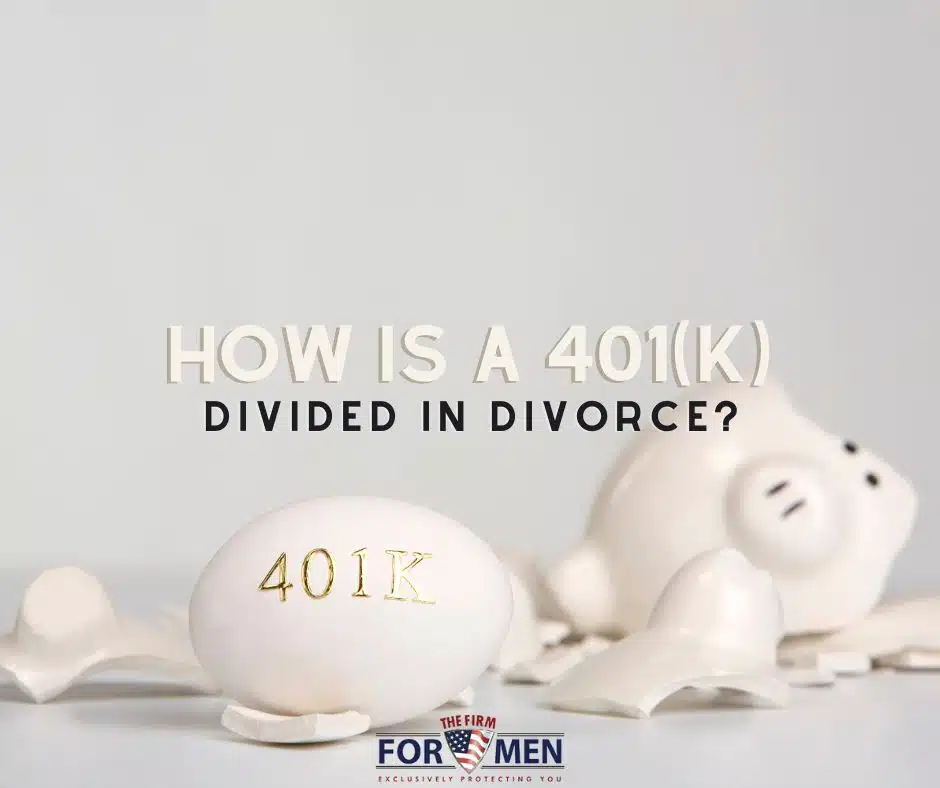You don’t think of the IRS as being a social influencer, but one of its creations has definitely gone viral: the 401(k), whose name comes directly from the tax code. A 401(k) and its nonprofit twin, the 403(b), are retirement plans offered by employers. These accounts reduce taxable income, can be matched by employers (that’s free money right there), and are only taxed when withdrawals are made. In short, they are valuable assets to be considered in a Virginia divorce.
Jump to a Section
Property Settlement
Every Virginia divorce begins with a separation. During separation, the two parties (you and your separated spouse) turn to experienced family law attorneys to hammer out the details of the property settlement agreement.
Beyond the five major sticking points (child custody, child support, spousal support, visitation, and equitable distribution of property), both parties have to drill down to every possible conflict. Both parties have to gather tremendous amounts of details and documents:
- Home title and deed
- Paying the mortgage and homeowners insurance
- Healthcare insurance
- Taxes
- Expenses
- Debts
- Assets
Everything gets a price tag so that everything can be equitably split between you and your nearly ex-spouse. How much is the family home worth? What can you get for the ATVs and RV? How do you assess the value of the Virginia Beach timeshare? And how much money is in each spouse’s retirement account?
Equitable Distribution
Virginia is not a community property state. The odds were not good that it would be — only nine of the 50 states consider all assets and debts acquired during marriage to be joint property — and so you cannot expect halfsies on everything.
In the nine community property states (Arizona, California, Idaho, Louisiana, Nevada, New Mexico, Texas, Washington, and Wisconsin, in case you were thinking of moving), everything is split down the middle.
In Virginia, everything is split equitably, and that includes retirement accounts, which include 401(k)s and 403(b)s.
Equitable distribution by a Circuit Court judge is guided by Virginia Code § 20-107.3. This finely crafted bit of excessive verbiage is perfect for insomniacs, so we will simplify it to four points:
- Everything is either separate property (assigned to one spouse), marital property (divided equitably between you two), or commingled property (separate property used to improve marital assets)
- Separate property returns to the spouse owning it; commingled or hybrid property is untangled as much as possible with the separate portion returned to the spouse contributing it
- All retirement accounts are divided equitably according to the same rules affecting all other property
- The judge uses 11 separate factors to determine the equitable division of all property
Marital Contributions
A Circuit Court judge treats your 401(k) and your spouse’s 401(k) as assets to be divided between you, based on your contributions. “Contributions” in this instance means not only the actual money you set aside for retirement, but other things:
- You each emotionally, sexually, and socially supported each other so you were productive, high-earning employees of your respective companies
- You maintained a marital home, attended to dry cleaning and the laundry, provided food and shelter, and helped one another be diligent workers
- You possibly provided each other with children and all the joys and cares that go with kids, so your lives were rich and fulfilling
Non-monetary contributions are factors in deciding who gave what to the marriage. Sure, you contributed $100,000 in 5 years of earnings to your 401(k), but your spouse kept you happy and healthy, so she deserves a slice of that money.
And, yes, your spouse put in $75,000 in her 403(b) during that time, but you changed the car’s oil, ironed work uniforms, and made your spouse that special latte every morning. You deserve a slice of your spouse’s retirement fund, too.
Tangled Assets
Retirement accounts get complicated when they start as separate property and continue into the time you were married. The tangled history has to be untangled, so you can determine a value as separate property and a value as marital property. Your spouse is only entitled to an equitable share of the marital property funds.
No matter what the judge unwraps, your spouse will never get more than half of your retirement accounts, whether they are 401(k) or 403(b) plans in all their permutations (Roth IRAs, SEP-IRAs, traditional IRAs, SIMPLE 401(k)s, etc.).
Working with your competent, insightful attorney is valuable during the separation and divorce, but will definitely pay huge benefits when you retire decades in the future. The nest egg protected by your attorney will have a chance to regenerate.
Even if your property settlement agreement compels you to cede 49 percent of your 401(k), you may also be awarded a portion of your spouse’s fund. The years and compound interest can significantly improve your retirement outlook.
Good Counsel
You have choices in choosing legal representation. Going with a catch-all law firm (one that handles immigration and insurance matters alongside divorce) is a risk to your retirement security. You need an experienced, attentive family law attorney familiar with property settlement. A good family law attorney can shepherd your 401(k) through the rough waters of separation and divorce, protecting your financial future. Contact The Firm For Men today, or telephone us at (757) 383-9184.

